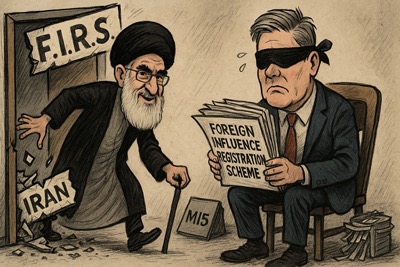
The former head of MI6, Sir Richard Dearlove, had explicitly named Iran agents in the UK as a threat against Britain's Jewish community. A warning issued well before the recent attack on the Manchester synagogue that left two people dead.
"There is a threat, there is a problem, whether it's the inspiration of radicals who are going to attack the Jewish community, or whether it's organising demonstrations which intimidate the Jewish community and encouraging those," - Sir Richard Dearlove told The Jewish Chronicle.
Yet despite Iran's extensive network and footprint in the UK and the "significant threat" it poses to the United Kingdom, none of the numerous outlets and individuals propagating Iran's influence in Britain have registered under the Foreign Influence Registration Scheme (FIRS) — clearly breaking the law and getting away with it.
When the UK's Foreign Influence Registration Scheme (FIRS) received Royal Assent in July 2023, it was heralded as a landmark moment in Britain's national security framework. Ministers and security officials described it as a "game changer" — a vital new tool to expose covert lobbying, counter foreign interference, and to protect British democracy. Then–Security Minister Tom Tugendhat confidently promised in a video on his YouTube channel that the measures would be used "immediately."
Fast forward more than two years, and that "game changer" has so far turned out to be little more than a public relations exercise.
A three-month grace period was introduced in July 2025 to allow individuals and organisations to comply. Iran and Russia were placed under the enhanced tier, with officials warning that anyone acting on their behalf in the UK without registering could face up to five years in prison.
Security Minister Dan Jarvis boldly declared:
"The Foreign Influence Registration Scheme sends a clear message: the UK will not tolerate covert foreign influence in our democracy. Those who fail to register risk up to five years in prison."
Despite these strong words, for more than two years after the law was passed, no one knew how or where to register. There was no visible register, no clear process, and no enforcement. Repeated questions to the Home Secretary and Home Office went unanswered.
Only last week did the government finally publish a working link to the register:Foreign Influence Registration Scheme
And what does it reveal?
Just four registrations. Not from Iran, Russia, or China — the so-called "hostile states" — but from Congo and Bosnia!
It's an outcome that makes a mockery of the government's promises and exposes how disconnected Westminster's security postures are from practical enforcement.
This comes despite repeated warnings from intelligence professionals. In 2013, the influential think tank Policy Exchangepublished an 87-page report, Tehran Calling, outlining Iran's deep network of cultural, media, and charitable outlets in the UK. More recently, on 10 July 2025, the UK's Intelligence and Security Committee released a 260-page report describing Iran as a "significant threat" to the UK, identifying journalists and regime critics in Britain as key targets of Iranian intelligence operations.
If the Foreign Influence Registration Scheme (FIRS) and the National Security Act were meant to mark a decisive leap forward in defending Britain from such threats, they have instead highlighted just how toothless and symbolic UK legislation has become. Two years on, FIRS has had virtually zero impact — turning what was supposed to be a robust national security reform into a bureaucratic embarrassment.
The scheme's purpose was sound: inspired by America's Foreign Agents Registration Act (FARA), it aimed to make foreign influence transparent. But poor delivery, lack of enforcement, and political complacency have left it hollow. Critics who warned it would be "symbolic rather than substantive" have been proven right.

Meanwhile, covert influence operations, cyber campaigns, and recruitment of British youth for propaganda or criminal acts continue unimpeded. Iran has continued to organise its annual Al-Quds Day rallies openly carrying posters of Iran's Supreme Leader, Ali Khamenei, and the police officers tasked with policing the rallies having no idea about what FIRS is!
Since the start of 2022, according to Sir Ken McCallum, the director general of MI5, the UK has responded to 20 Iran-backed plots, presenting potentially lethal threats to British citizens and UK residents.
In May this year, the Israeli embassy in London was the target of an alleged terror plot involving a group of Iranian nationals who were detained by police after a series of raids across England. It is thought it was the Israeli intelligence who tipped off their British counterparts.
The UK's much-vaunted FIRS has become another performative gesture — a law without teeth, a register without names, and a system without credibility.
With only four entries to show for all the hype, the Foreign Influence Registration Scheme has not just failed to deliver — it has undermined faith in the UK's ability to take its own national security seriously.
 IPT Senior Fellow Potkin Azarmehr is a London-based investigative journalist, business intelligence analyst, and TV documentary maker who was born in Iran. He regularly contributes to several newspapers and television stations on Iran and Middle East related news. You can follow him on Twitter @potkazar.
IPT Senior Fellow Potkin Azarmehr is a London-based investigative journalist, business intelligence analyst, and TV documentary maker who was born in Iran. He regularly contributes to several newspapers and television stations on Iran and Middle East related news. You can follow him on Twitter @potkazar.
Articles by the IPT may be re-published as long as full attribution and a link back to the original article is provided. |


